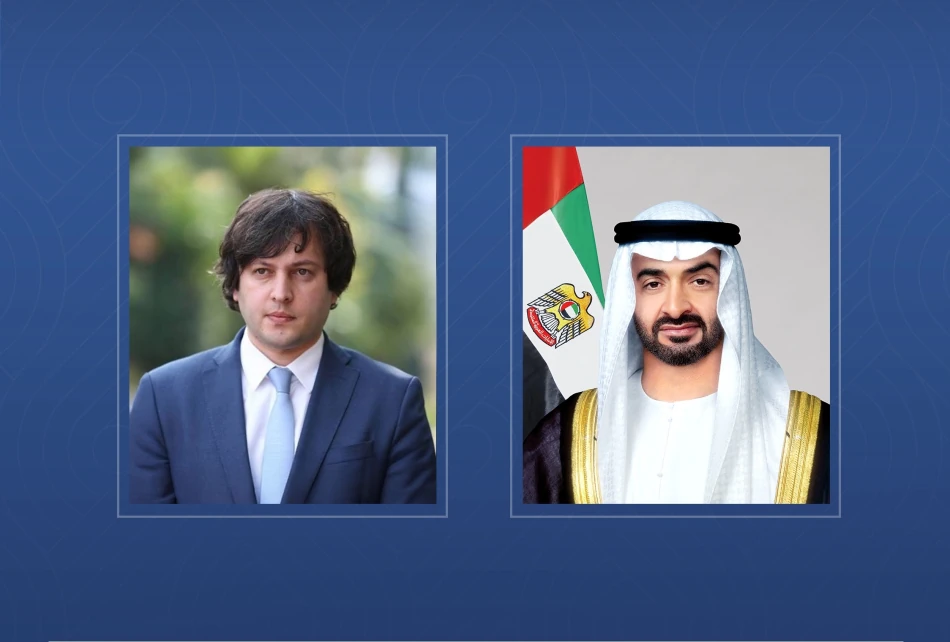
UAE President, Georgian PM Discuss Expanding Comprehensive Economic Partnership
UAE-Georgia Partnership Deepens as Sheikh Mohamed bin Zayed Visits Tbilisi
The UAE is expanding its strategic footprint in the Caucasus region as President Sheikh Mohamed bin Zayed Al Nahyan held high-level talks with Georgian Prime Minister Irakli Kobakhidze in Tbilisi, focusing on strengthening economic ties through their 2023 Comprehensive Economic Partnership Agreement. The visit underscores the Emirates' broader strategy to diversify partnerships beyond traditional Gulf allies and tap into emerging markets positioned between Europe and Asia.
Strategic Timing in a Volatile Region
The UAE leader's visit to Georgia comes at a critical juncture for the South Caucasus region, which has experienced significant geopolitical shifts following Russia's invasion of Ukraine. Georgia's position as a transit corridor between Europe and Central Asia makes it an attractive partner for the UAE, which has been seeking to expand trade routes and reduce dependence on traditional shipping lanes.
During the talks, Sheikh Mohamed emphasized the UAE's commitment to fostering peace and stability in the Caucasus region, a message that resonates strongly given Georgia's complex relationship with Russia and ongoing territorial disputes over South Ossetia and Abkhazia.
Economic Partnership Takes Center Stage
Building on the 2023 Framework
The discussions centered on implementing the Comprehensive Economic Partnership Agreement signed between the two countries in 2023. Sheikh Mohamed described this agreement as a "qualitative leap" in bilateral economic cooperation, signaling the UAE's intention to move beyond symbolic partnerships toward substantial economic integration.
Key sectors identified for collaboration include:
Investment and Finance: The UAE's sovereign wealth funds and private equity firms are likely eyeing opportunities in Georgia's developing financial sector and infrastructure projects.
Renewable Energy: This aligns with the UAE's post-oil diversification strategy and Georgia's abundant hydroelectric potential, creating synergies for clean energy projects.
Agriculture: Georgia's agricultural sector could benefit from UAE investment and technology transfer, while providing the Emirates with food security partnerships.
Eagle Hills Agreement Signals Concrete Investment
The signing of an agreement between UAE-based Eagle Hills and Georgia's Ministry of Economy and Sustainable Development, witnessed by both leaders, suggests tangible investment flows are materializing. Eagle Hills, led by Mohamed Alabbar, has a track record of major urban development projects across emerging markets, indicating Georgia may see significant real estate and infrastructure development backed by Emirati capital.
Regional Implications and Market Perspective
Caucasus as the New Investment Frontier
For investors, the UAE's increased focus on the Caucasus region represents a calculated bet on geography and timing. Georgia offers several advantages: a liberal economic framework, EU association agreement benefits, and strategic location connecting European and Asian markets. The country's relatively small economy—around $24 billion GDP—means UAE investment could have outsized impact.
This partnership mirrors the UAE's successful economic diplomacy in other regions, from its investments in East Africa to its growing presence in Central Asia. The model typically involves infrastructure development, financial services expansion, and trade facilitation—areas where Emirati expertise and capital can create mutual benefits.
Broader Strategic Context
The UAE's engagement with Georgia should be viewed within its larger foreign policy pivot toward economic pragmatism over ideological alignment. While maintaining strong Western ties, the Emirates has demonstrated willingness to work with diverse partners when commercial interests align.
For Georgia, deeper UAE partnership offers several strategic benefits: diversified investment sources, reduced dependence on European funding, and potential access to Gulf markets. Georgian Prime Minister Kobakhidze's emphasis on learning from the UAE's "inspiring developmental model" suggests Georgia sees the Emirates as a template for small-state economic success.
The partnership also positions both countries to benefit from shifting global trade patterns, particularly as businesses seek alternatives to traditional East-West corridors affected by ongoing geopolitical tensions. Georgia's role in the Middle Corridor connecting China to Europe could be significantly enhanced with UAE logistics expertise and investment.
Most Viewed News

 Sara Khaled
Sara Khaled






